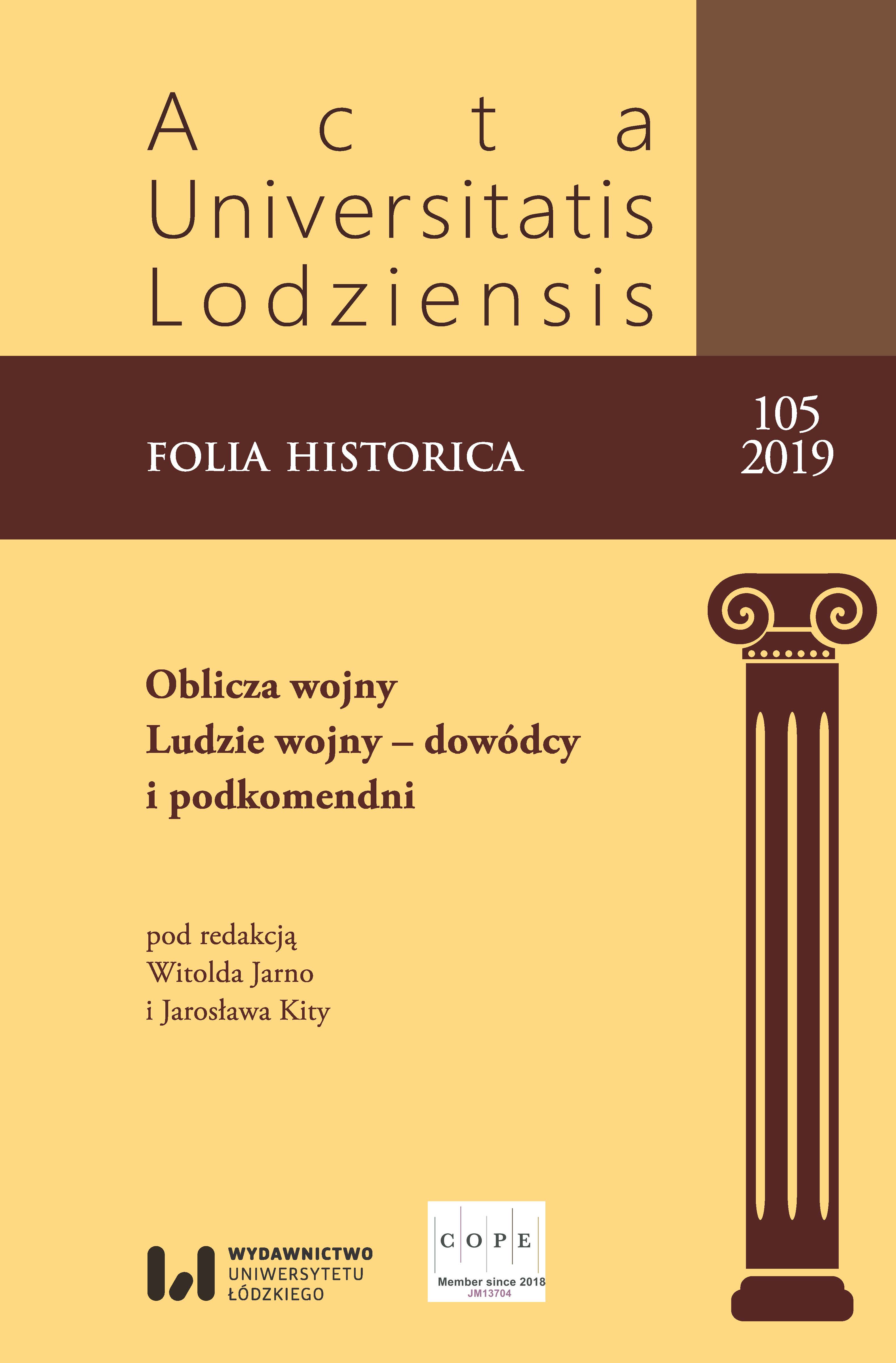People of war in media’s picture of the world
DOI:
https://doi.org/10.18778/0208-6050.105.13Keywords:
people of war, war, information warfare, war victims, manipulation, disinformation, propagandaAbstract
Usually, we limit our understanding of the term “people of war” to those who trigger a war, lead, fight as commanders and soldiers. People of war are not only political leaders, commander chiefs, great and small and their armies. People of war are also attacked, beleaguered and oppressed nations, living in peace people of different countries and societies, not involved in conflict, observers of these events and their victims. They are also societies, nations, and civilizations, every one who is constantly manipulated and unconsciously participating in war with smaller or larger consequences. The threat to people is not only conventional war, but information warfare using such tools as: propaganda, disinformation, inspiration, manipulation of information, social engineering. This is how the mentioned people, spectators of TV and other media including social media, become participants of the war, supporting it or not, voting for governments or not, participating humanitarian actions or not. Their views, choices and decisions may depend in some degree of the aggressor. Information warfare is devastating, like any war, only in a different way, without blood. The people of war are almost the entire population of the world who has access to information in global information system. The authorities, opinion-makers, social groups, entire countries and nations are affected.
Downloads
References
Amerykańska koncepcja walki informacyjnej, „Wojskowy Przegląd Zagraniczny” 1998, nr 4, s. 13–19.
Google Scholar
Brzeski R., Wojna informacyjna – wojna nowej generacji, Komorów 2014.
Google Scholar
Ciborowski L., Potencjalne zagrożenia – identyfikacja i charakterystyka, „Myśl Wojskowa” 2000, nr 4, s. 85–89.
Google Scholar
Clausewitz C., O wojnie, Kraków 2010.
Google Scholar
Derlatka K., Cyberzagrożenia w edukacji dla bezpieczeństwa i świadomość uczniów w obszarze bezpieczeństwa Internetu, „Interdyscyplinarne Studia Społeczne – Czasopismo Naukowe UNS” [Łódź] 2017, nr 1 (3), s. 23–40.
Google Scholar
Derlatka K., Potęga informacji, „Interdyscyplinarne Studia Społeczne – Czasopismo Naukowe UNS” [Łódź] 2016, nr 1 (1), s. 27–38.
Google Scholar
Doktryna bezpieczeństwa informacyjnego RP, Projekt z dnia 24 lipca 2015, Biuro Bezpieczeństwa Narodowego.
Google Scholar
Fryc M., Polska strategia obronności wobec zagrożenia militarnego z elementami „wojny hybrydowej”, „Bezpieczeństwo Narodowe” 2015, nr 33, s. 61–79.
Google Scholar
Le Bon G., Psychologia tłumu, Kęty 2005.
Google Scholar
Lind W.S., Understanding Fourth Generation War, „Military Review”, September–October 2004, No. 1, s. 12–16.
Google Scholar
Report on the human rights situation in Ukraine, Office of the United Nations High Commissioner for Human Rights, 16 May–15 August 2017.
Google Scholar
Tzu S., Sztuka wojny, Gliwice 2014.
Google Scholar
Volkoff V., Psychosocjotechnika dezinformacja. Oręż Wojny, Komorów 1999.
Google Scholar
Wojnowski M., Koncepcja „wojny nowej generacji” w ujęciu strategów Sztabu Generalnego Sił Zbrojnych Federacji Rosyjskiej, „Przegląd Bezpieczeństwa Wewnętrznego” 2015, nr 13 (7), s. 13–39.
Google Scholar
Balcer A., Na wirażu. Ukraina cztery lata po rewolucji godności, https://forumdialogu.eu/2018/03/22/na-wirazu-ukraina-cztery-lata-po-rewolucji-godnosci/ (dostęp: 27 IX 2018).
Google Scholar
Brzeski R., Wojna czwartej generacji, 23 II 2013, http://niepoprawni.pl/blog/6063/wojna-czwartej-generacji (dostęp: 4 IX 2018).
Google Scholar
German Death Camps, https://www.germandeathcampsnotpolish.com; germandeathcamps.org (dostęp:18 IX 2018).
Google Scholar
(MINI)SŁOWNIK BBN: Propozycje nowych terminów z dziedziny bezpieczeństwa, https://www.bbn.gov.pl/pl/bezpieczenstwo-narodowe/minislownik-bbn-propozy/6035,MINISLOWNIKBBN-Propozycje-nowych-terminow-z-dziedziny-bezpieczenstwa.html (dostęp: 27 IX 2018).
Google Scholar
Obecny kryzys migracyjny, http://uchodzcy.info/infos/obecny-kryzys-migracyjny/ (dostęp: 7 IX 2018).
Google Scholar
Source List and Detailed Death Tolls for the Primary Megadeaths of the Twentieth Century, http://necrometrics.com/20c5m.htm#Second (dostęp: 16 IX 2018).
Google Scholar
To dlatego utonął syryjski chłopiec. Za jego śmierć odpowiada ojciec, http://niezalezna.pl/70859-to-dlatego-utonal-syryjski-chlopiec-za-jego-smierc-odpowiada-ojciec (dostęp: 21 IX 2018).
Google Scholar
Tomlinson A., How The Media Can Manipulate Our Viewpoint, https://regionalpost.com/how-the-media-can-manipulate-ourviewpoint/ (dostęp: 18 IX 2018).
Google Scholar
Downloads
Published
How to Cite
Issue
Section
License

This work is licensed under a Creative Commons Attribution-NonCommercial-NoDerivatives 4.0 International License.











